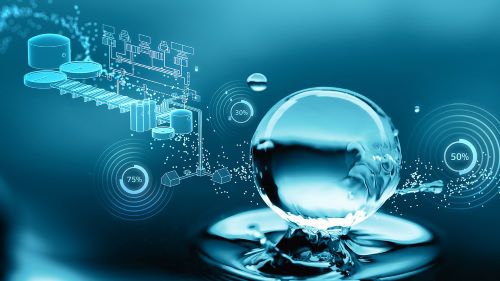Discover how engineers are at the forefront of revolutionizing water sanitation systems with advanced technologies like nanotechnology, solar-powered filtration, and acoustic nanotubes, bringing us closer to a water-secure world.
As a vital and irreplaceable asset, water plays a fundamental role in sustaining life, supporting human well-being, and fostering economic advancement. Nevertheless, the escalating global population, rapid urbanization, and the impacts of climate change have triggered a surge in water demand, posing considerable obstacles in our quest to provide clean and accessible water to everyone. To tackle these challenges head-on, water engineering emerges as a pivotal and indispensable discipline.
Water engineering is a multidisciplinary field involving water infrastructure planning, design, construction, and management. It includes tasks like water supply systems, wastewater treatment plants, irrigation, flood control, and hydroelectric power facilities. Its significance is pivotal in addressing water-related challenges and achieving sustainable development goals.
This engineering area is crucial in securing clean drinking water access for communities. According to the World Health Organization, approximately 2.2 billion people lack access to safe drinking water services, and even more, around 4.2 billion, do not have essential sanitation services. This scarcity of clean water increases the risk of waterborne diseases like cholera, diarrhea, and typhoid, posing significant health threats, especially to vulnerable groups like children and the elderly.
Engineers actively strive to create efficient water supply systems encompassing source water protection, water treatment, and distribution networks. They also formulate sustainable water resource management strategies to ensure a continuous supply of safe water for human consumption in the long run.
Water engineering includes vital wastewater treatment to manage growing urban and industrial wastewater. Water engineers design efficient treatment plants to remove pollutants, safeguard the environment, and conserve water by recycling treated wastewater.
But what are some of the latest developments in this area?
4 Advanced Water Sanitation System Technologies
As we embrace the fourth industrial revolution, novel water sanitation systems, and cutting-edge technologies are steadily reaching the surface.
While the journey to providing clean water for all remains ongoing, new and advanced water technologies represent a promising step in the right direction.
Here are four emerging technologies that are poised to play a pivotal role in providing much-needed water to communities worldwide:

Nanotechnology for Water Purification: In the quest to provide accessible and cost-effective water solutions, nanotechnology has emerged as a promising tool. By leveraging nanotechnology, countries can efficiently remove contaminants from water, thus increasing its availability.
Nanotechnology operates at the molecular level, manipulating water atoms to achieve effective purification. This innovative approach is utilized in various water purification processes, including desalination, filtration, remediation, and water treatment.
Carbon nanotube (CNT) technology is a common and impactful water purification technique in the nanotech realm. CNT-based filtration systems effectively eliminate organic, inorganic, and biological compounds, ensuring the safety and potability of the treated water.
Acoustic Nanotube Technology: Originally developed by NASA for wastewater treatment and recycling on the International Space Station, Acoustic Nanotube Technology has found broader applications on Earth. Unlike traditional methods that rely on pressure, this innovative approach utilizes acoustics to propel water through carbon nanotubes.
Carbon nanotubes are integrated into a filter matrix in this system, allowing water molecules to pass through while retaining contaminants. An oscillator circuit generates acoustic vibrations, prompting water molecules to de-bond and pass through the filter for purification. This groundbreaking technology holds significant promise for enhancing water treatment processes.
Automatic Variable Filtration (AVF): This system presents a simple yet highly effective water purification technology. This method operates by directing influent upward through a downward flow of filter media, achieving impressive results without further filtration or cleaning.
One of the notable advantages of AVF is its minimalistic design, free from moving parts and power requirements. As a result, this system stands out as a cost-effective and energy-efficient solution. AVF technology finds suitability in various applications, including wastewater treatment and reuse, municipal drinking water, and pre-filtration and desalination processes.
Solar-Powered Water Filtration: Innovative research from Princeton University has created a groundbreaking Solar Absorber Gel designed for contaminated water.
This solar gel has the unique ability to absorb water at room temperature and release it when heated. Comprising three layers, the gel utilizes polydopamine to convert solar energy into heat, while the third layer consists of alginate.
As contaminated water passes through the gel, it undergoes purification, effectively filtering pathogens, metals, and other harmful molecules.
Remarkably, the device operates on a passive gravity-based filtration method, relying solely on solar power. The result is rapid and efficient clean water delivery, surpassing some conventional advanced water treatment technologies.
The GoSun Flow (demonstrated in the accompanying video) is a solar water purification system small enough to fit into a backpack, using solar energy to filter 99.99% of pathogens from water, and can function as a portable hand washing station, providing a hot shower, and a source of clean drinking water.
The Future of the World’s Water
This provides an idea of the engineering solutions that are addressing the ever-growing global water demand.
Civil, Water, and Chemical Engineers and others play a crucial role in implementing and integrating these solutions with emerging digital technologies and novel engineering approaches.
As millions worldwide grapple with the harsh reality of water scarcity, the urgent need for these solutions becomes evident.
Through the dedicated efforts of engineers, a sustainable and water-secure future for all is possible.
REFERENCES
The Importance of Water Engineering
The Future of Water: Engineering Contributions to Water Management
7 Advanced Technologies To End The Clean Water Crisis


